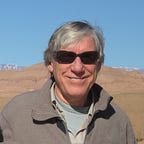Robert Frost on Mindfulness — Stopping by Woods on a Snowy Evening
Frost’s poem, Stopping by Woods on a Snowy Evening, is just plane lovely, few embellishments. The first three stanzas remind us of the old adage that we need to take time to smell the roses, even if it baffles a companion, in this case the “little horse”. While much literature today is devoted to mindfulness, encouraging all to deliberately seek out the restorative value of nature, Frost is not the only author to hint at this theme long before it became a ‘spiritual’ quest.
The last stanza brings us back to a simple reality. We have obligations, “promises to keep before we sleep”. Some might conclude that Frost’s use of the term “sleep” is the not infrequent euphemism for death. Perhaps that is his meaning. If so, it would be reminiscent of John Keats famous lines: “When I have fears that I may cease to be, / Before my pen has gleaned my teaming brain.” However, in my view, the poem in no less powerful if he meant it literally, his trip had a utilitarian purpose.
As for rhyming and other literary devices, Frost personifies both horse and snow flakes. The little horse “must think it queer” to have stopped where he did and shakes his bell as if “to ask if there is some mistake”. Everyone in Canada experiences snow and like it best as downy or what skiers might call powder. If your hands are protected by mittens or gloves, fluffy snow does resemble duck or goose down or downy as Frost terms it. And such light snow can be good insulation, as the Inuit have taught us.
I was intrigued by Frost’s rhyming technique, perhaps unique to him. His first stanza ends in know, though, here and snow (AABA). The second picks up the “ere” phoneme and adds lake (queer, near, lake and year (BBCB). Frost follows in the third stanza by repeating the “ake” sound (shake, mistake, sweep and flake (CCDC). A common technique is to break the pattern in a final stanza for emphasis; he does so and it is effective, even more so with the aid of repetition and picking up the “eep” rhyming ending from stanza three (DDDD).
And miles to no before I sleep, / And miles to go before I sleep.
I am sure we all feel the same way, literally or figuratively.
Here is the complete poem for your enjoyment and analysis.
Whose woods these are I think I know. / His house is in the village though; / He will not see me stopping here / To watch his woods fill up with snow.
My little horse must think it queer / To stop without a farmhouse near / Between the woods and frozen lake / The darkest evening of the year.
He gives his harness bells a shake / To ask if there is some mistake. / The only other sound’s the sweep / Of easy wind and downy flake.
The woods are lovely, dark and deep, / But I have promises to keep, / And miles to go before I sleep, / And miles to go before I sleep.
